Did you know that a Pomsky’s diet plays a crucial role in their overall health and well-being? Providing them with the right nutrition is vital for preventing common health issues and ensuring they lead a happy, active life. But what exactly does a Pomsky need in their diet to thrive? Let’s dive into the world of Pomsky health and nutrition to discover the optimal diet for these delightful mixed breed dogs.
Key Takeaways:
- A raw, natural, and whole food diet is best for Pomskies, preventing health conditions such as obesity, joint issues, dental problems, digestive issues, and allergies.
- Feeding schedules and portion sizes should be adjusted based on a Pomsky’s age, weight, activity level, and individual needs.
- The debate between wet and dry dog food is subjective, but both options can be suitable as long as they are high-quality and meet the Pomsky’s nutritional requirements.
- There are certain foods that are toxic or harmful to Pomskies, such as grapes, chocolate, onions, and fish. Avoiding these foods is essential for their well-being.
- Consider a Pomsky’s age, breed, and any specific health conditions when selecting their food. Consulting with a vet can help determine the best diet for your furry friend.
Feeding Schedule and Portion Sizes for Pomskies
When it comes to feeding your Pomsky, establishing a proper feeding schedule and determining appropriate portion sizes are essential for their overall health and weight management. By following these Pomsky feeding guidelines, you can ensure that your furry friend receives the right amount of nutrition to thrive.
Feeding Schedule
The feeding schedule for Pomskies depends on their age and developmental stage. For puppies aged 2-6 months, it is recommended to feed them three meals daily, with snacks in between. This frequent feeding pattern supports their growing bodies and provides them with a steady supply of energy.
Once your Pomsky reaches six months of age, you can transition to a feeding schedule of two meals per day, along with snacks as needed. This schedule helps to maintain a healthy routine and digestion.
Portion Sizes
The portion sizes for Pomskies vary depending on their weight, activity level, and individual needs. It’s important to consider these factors when determining how much to feed your furry companion.
| Pomsky Weight | Portion Size |
|---|---|
| 2-4 lbs | 1/3 to 1/2 cups per day |
| 5-10 lbs | 1/2 to 3/4 cups per day |
| 11-15 lbs | 3/4 to 1 cup per day |
| 16-20 lbs | 1 to 1 1/4 cups per day |
These portion sizes serve as a general guideline. However, it is important to adjust the portions based on your Pomsky’s specific needs, metabolism, and the type of dog food you are using. Reading the labels of specific dog food brands can provide recommended portions for their products.
Remember, portion control is crucial for Pomsky weight management. Overfeeding can lead to obesity and related health issues, while underfeeding can result in inadequate nutrition. If you are unsure about the appropriate portion sizes for your Pomsky, consult with your veterinarian for personalized advice.
Wet or Dry Dog Food for Pomskies
When it comes to choosing the right food for your Pomsky, the debate between wet and dry dog food is subjective. Both options have their pros and cons, and the decision ultimately depends on your Pomsky’s preferences and nutritional needs.
Dry dog food, also known as kibble, is often recommended as it offers several benefits. First, it helps promote dental health by requiring your Pomsky to chew, which can reduce the risk of dental issues such as tartar buildup. The act of chewing also stimulates saliva production, which aids in the breakdown of food and digestion. Additionally, dry food tends to have a longer shelf life and is more convenient to store and serve.
On the other hand, some Pomskies may prefer wet dog food due to its taste, texture, and high moisture content. Wet food can be especially appealing for dogs with dental issues or older dogs who may struggle with chewing dry kibble. If your Pomsky doesn’t drink much water, supplementing their diet with wet food can help ensure an adequate water intake, promoting hydration.
When making a decision, it’s crucial to choose high-quality dog food, regardless of whether it’s wet or dry. Look for reputable brands that prioritize the nutritional needs of your Pomsky. Check the ingredients list to ensure the food contains high-quality proteins, essential nutrients, and is free from fillers, artificial additives, and excessive amounts of carbohydrates.
Ultimately, the key is to choose a dog food that meets your Pomsky’s specific dietary requirements and preferences, while providing them with the essential nutrients they need to thrive.
Comparison of Wet and Dry Dog Food for Pomskies
| Criteria | Wet Dog Food | Dry Dog Food (Kibble) |
|---|---|---|
| Taste and Texture | Often more palatable due to its moisture and flavor variety | Varies, but generally has a crunchier texture |
| Dental Health | May be more suitable for dogs with dental issues as it requires less chewing | Promotes dental health by encouraging chewing and saliva production |
| Nutrient Content | Contains higher moisture content and may provide added hydration | Offers more concentrated nutrition and longer shelf life |
| Convenience | Easier to serve and can be more convenient for owners | Convenient to store and often comes in larger quantities |
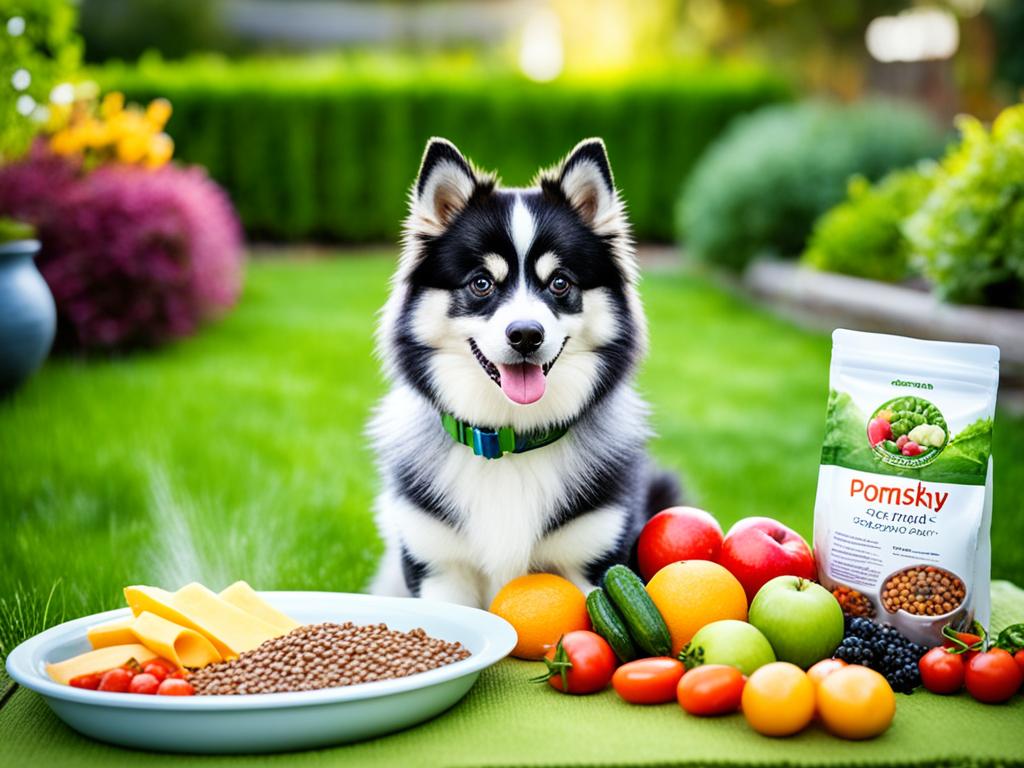
Foods to Avoid for Pomskies
When it comes to the Pomsky diet, there are certain foods that should be strictly avoided due to their toxic or harmful effects on these adorable crossbreeds. These foods can pose serious health risks to your furry friend and should never be included in their diet. It is crucial for Pomsky owners to be aware of these harmful foods and take necessary precautions to protect their pet’s health and well-being.
Toxic and Harmful Foods for Pomskies
Here is a list of foods that should be avoided in the Pomsky diet:
| Foods to Avoid | Potential Health Issues |
|---|---|
| Grapes and Raisins | Toxicity can lead to kidney problems and even kidney failure. |
| Fruit Seeds and Pits | Contain cyanide and can cause choking hazards or cyanide poisoning. |
| Chocolate | Contains theobromine and caffeine, which can cause seizures and even be fatal. |
| Salt | Excess sodium intake can lead to dehydration, electrolyte imbalances, and kidney problems. |
| Coffee, Tea, and Soda | The stimulants present can cause increased heart rate, tremors, and restlessness. |
| Onions | Contain compounds that can damage red blood cells, leading to anemia. |
| Fish | Specific types of fish can contain toxins that are harmful to dogs, leading to digestive issues and even poisoning. |
These foods should be strictly off-limits to your Pomsky to ensure their safety and well-being. Even a small amount of these toxic or harmful foods can cause severe health issues and, in some cases, be life-threatening. It is essential to be vigilant and avoid any accidental exposure to these harmful ingredients.
Providing a safe and healthy diet is crucial to keep your Pomsky happy and thriving. Being aware of the foods to avoid and taking appropriate precautions will go a long way in ensuring the well-being of your beloved furry companion.
Age and Breed-Specific Dietary Needs
When it comes to choosing food for your Pomsky, it’s essential to consider their age and breed. Just like humans, dogs have different nutritional needs at different stages of life. Puppies have specific dietary requirements to support their growth and development, while adult dogs need a balanced diet to maintain their overall health. Additionally, senior dogs or dogs with health conditions may require specialized diets to meet their specific needs.
Each breed also has its own unique nutritional requirements and may be prone to certain health conditions. As a Pomsky owner, it’s important to select food that is suitable for their age, size, breed, and any existing health conditions they may have. By providing a diet tailored to their individual needs, you can help promote their health and well-being.
Consulting with a veterinarian is highly recommended to determine the best diet for your Pomsky. A vet can provide valuable guidance based on your dog’s age, breed, activity level, and any medical concerns. They can help you choose the right type of food, portion sizes, and any necessary supplements to ensure your Pomsky receives optimal nutrition.
Dietary Considerations for Different Ages:
| Life Stage | Dietary Considerations |
|---|---|
| Puppies |
|
| Adults |
|
| Seniors |
|
By understanding and addressing the age and breed-specific dietary needs of your Pomsky, you can ensure they receive the right nutrition to thrive.
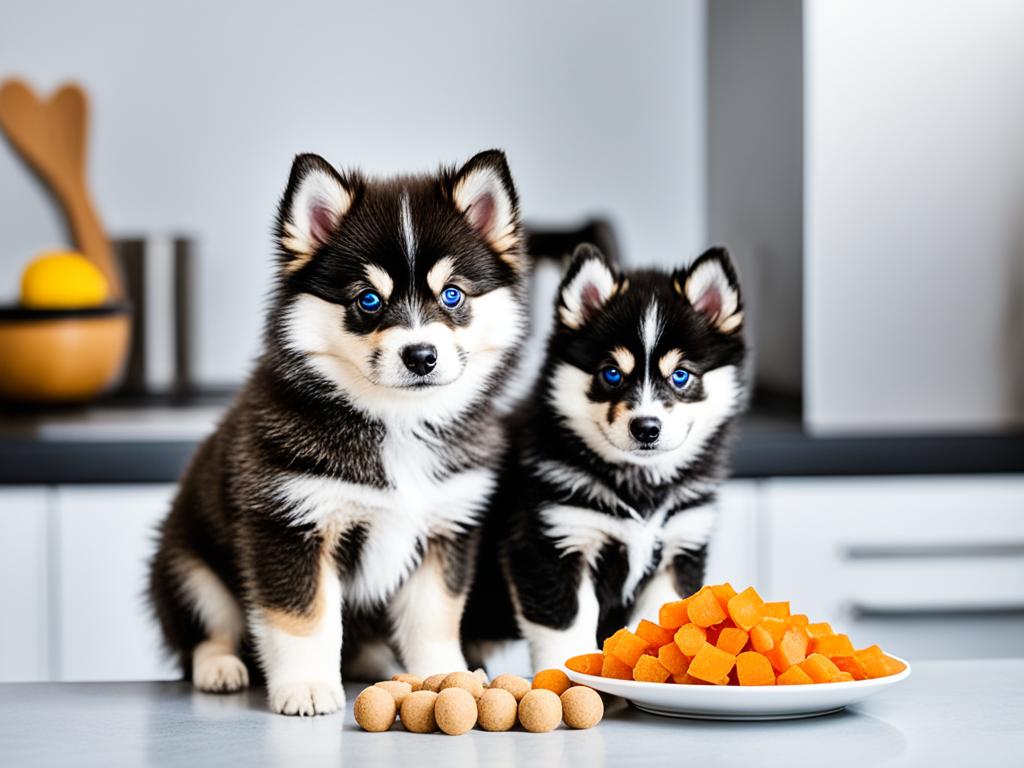
The Benefits of Fresh Foods for Pomskies
Fresh fruits and vegetables play a crucial role in meeting the nutritional needs of Pomskies. They provide high-quality fibers and essential vitamins that contribute to a healthy and balanced diet, promoting overall health and vitality. Incorporating fresh foods into your Pomsky’s meals can provide them with the necessary nutrients for optimal health throughout their life, including their senior years.
When it comes to selecting fresh foods for your Pomsky, there are several safe options that you can consider:
- Apples: Rich in fiber and packed with vitamins A and C, apples make a healthy and refreshing treat for your Pomsky.
- Bananas: Not only are bananas a great source of potassium, but they also contain vitamins B6 and C, providing an energy boost for your furry friend.
- Blueberries: These delicious berries are packed with antioxidants, fiber, and vitamins, promoting cardiovascular health and cognitive function in Pomskies.
- Cucumbers: Low in calories and high in hydrating properties, cucumbers serve as a refreshing and nutritious option for your Pomsky.
- Carrots: Carrots are a fantastic source of beta-carotene, promoting good eyesight, and providing essential vitamins and fiber for a healthy digestive system.
- Green beans: Green beans are an excellent source of vitamins A, C, and K, as well as providing dietary fiber for Pomskies.
It’s crucial to serve these fresh foods in moderation, alongside a balanced diet recommended by a veterinarian. Consulting with a vet will ensure that your Pomsky’s specific nutritional needs are met, taking into account factors such as their age, breed, weight, and any existing health conditions.
By incorporating fresh fruits and vegetables into your Pomsky’s diet, you can provide them with a variety of essential nutrients that contribute to their overall health and energy levels. To give your Pomsky the best nutritional benefits, combine these fresh foods with high-quality commercial dog food that meets their specific dietary requirements.
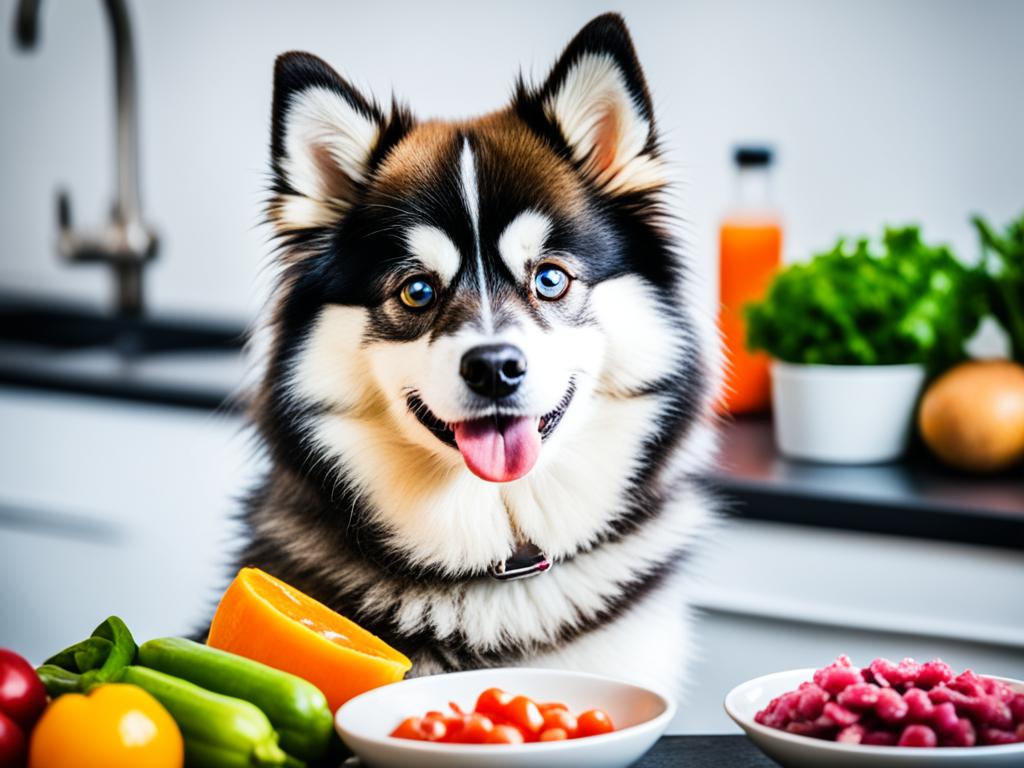
Reading Labels and Choosing High-Quality Dog Food
When it comes to your Pomsky’s diet, reading labels and choosing high-quality dog food is of utmost importance. It’s essential to make informed choices rather than relying solely on advertisements or marketing campaigns. By understanding how to read labels and what to look for, you can ensure that you provide the best food for your Pomsky’s optimal health and well-being.
Here are some key factors to consider when reading labels:
- High Nutritional Value: Look for dog food that offers a high nutritional value with essential vitamins, minerals, and proteins. Choose options that prioritize the specific dietary needs of Pomskies to support their overall health.
- Absence of Harmful Additives: Avoid dog food that contains harmful preservatives, artificial flavors, or unnecessary fillers. Opt for options that use natural and wholesome ingredients to ensure the best quality for your Pomsky.
- Specific Dietary Needs: Every Pomsky is unique, and their dietary needs may vary. Check the ingredients list to ensure that the dog food you choose meets your Pomsky’s specific dietary requirements, whether it’s for weight management, allergies, or other health concerns.
Choosing reputable brands that provide high-quality dog food tailored to your Pomsky’s nutritional needs is highly recommended. These brands are often backed by extensive research and follow strict quality control measures to ensure the best food for your furry friend.
The Importance of Reading Labels
By carefully reading labels and understanding the ingredients, you can make informed decisions about the best food for your Pomsky. This practice helps you avoid dog food that might not meet your Pomsky’s specific dietary needs or contain harmful additives. Prioritizing high-quality dog food ensures that your Pomsky receives the necessary nutrients for a healthy and vibrant life.
Comparison of Popular Dog Food Brands
| Brand | Nutritional Value | Absence of Harmful Additives | Specific Dietary Options |
|---|---|---|---|
| Brand 1 | High | Yes | Yes |
| Brand 2 | Moderate | Yes | Yes |
| Brand 3 | High | No | No |
The table above provides a comparison of popular dog food brands, taking into account their nutritional value, absence of harmful additives, and specific dietary options. It can serve as a guide to help you make an informed decision when choosing the best food for your Pomsky.
Supplementing Kibble with Fresh Foods
While kibble is convenient, it should not be relied upon solely for a Pomsky’s diet. Packed dog food may lack live nutrients and fresh ingredients. Supplementing kibble with fresh foods like fruits, vegetables, or even raw food can provide added nutritional benefits for your Pomsky. Fresh foods can be served as purees or whole, offering your Pomsky a variety of textures and flavors.
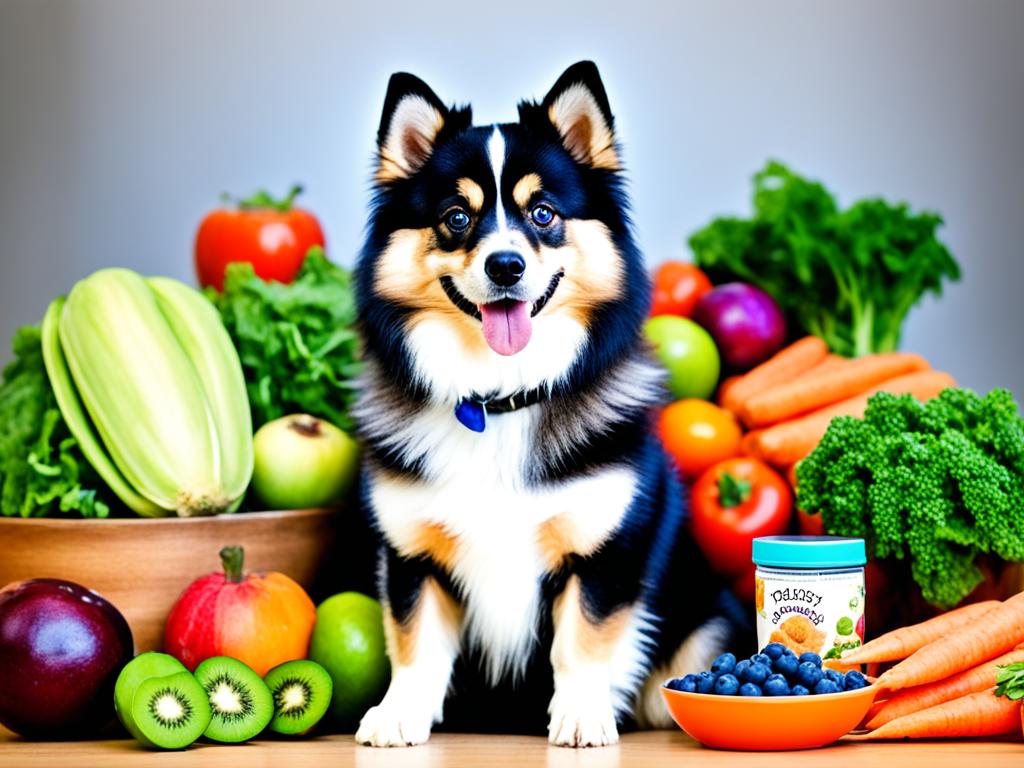
Benefits of Fresh Foods for Pomskies
Introducing fresh foods into your Pomsky’s diet can have several benefits. Fresh fruits and vegetables are rich in vitamins, minerals, and antioxidants that promote overall health and well-being. They also provide high-quality fiber, aiding in digestion and maintaining a healthy weight. By incorporating fresh foods, you can diversify your Pomsky’s diet and ensure they receive a balanced and nutritionally complete meal.
Types of Fresh Foods to Include
When supplementing kibble with fresh foods, it’s important to choose options that are safe and suitable for Pomskies. Some recommended fresh foods include:
- Apples
- Bananas
- Blueberries
- Cucumbers
- Carrots
- Green beans
These foods are not only nutritious but also offer a variety of flavors that can entice your Pomsky’s palate. You can serve them as purees or add them as toppings to kibble to enhance the mealtime experience, making it more enjoyable for your furry friend.
Considerations When Adding Fresh Foods
When incorporating fresh foods into your Pomsky’s diet, it’s essential to do so gradually. Gradual introduction allows their digestive system to adjust and reduces the likelihood of any digestive upset. Additionally, it’s important to choose fresh foods that are safe for dogs, avoiding ingredients that may be toxic or harmful.
Consulting with a veterinarian is highly recommended before introducing any new foods into your Pomsky’s diet. They can provide guidance on portion sizes, frequency, and any specific dietary considerations based on your Pomsky’s individual needs and health conditions.
Pomsky Diet and Exercise
A healthy diet is not the only factor in maintaining a Pomsky’s overall health. Regular exercise is equally important for weight management and keeping a Pomsky fit. Daily walks, playtime, and mental stimulation are essential for their physical and mental well-being. It is crucial to incorporate exercise into their daily routine to prevent obesity and promote a healthy weight.
The Pomsky is an active and playful breed that requires regular exercise to burn off excess energy. Aim for at least 30 minutes to 1 hour of physical activity every day. This can be achieved through a combination of walking, running, playing fetch, or engaging in interactive games. Mental stimulation, such as puzzle toys or obedience training, is also beneficial for their overall well-being.
In addition to weight management, exercise offers several other benefits for Pomskies:
- Improved cardiovascular health
- Stronger muscles and bones
- Enhanced joint flexibility
- Enhanced mental stimulation and cognitive development
- Reduced anxiety and behavioral issues
By ensuring a balanced diet and regular exercise routine, you can contribute to your Pomsky’s overall health and longevity. Remember to consult with your veterinarian for specific dietary and exercise recommendations tailored to your Pomsky’s individual needs.
The Importance of Weight Management
Proper weight management is crucial for optimal health and longevity in Pomskies. Being overweight can lead to various health issues, including joint problems, heart disease, and diabetes. Paying attention to your Pomsky’s weight is essential for maintaining their overall well-being.
Here is a general guideline for Pomsky weight management:
| Weight Category | Healthy Weight Range |
|---|---|
| Toy Pomskies (5-10 pounds) | 4-7 pounds |
| Standard Pomskies (15-30 pounds) | 12-25 pounds |
Keep in mind that individual Pomskies may have different weight requirements based on factors such as age, activity level, and overall health. Regular visits to the veterinarian can help monitor your Pomsky’s weight and make any necessary adjustments to their diet and exercise routine.
Conclusion
Providing an optimal and balanced diet is crucial for the overall health and well-being of your Pomsky. To ensure their nutrition needs are met, it is recommended to feed them a natural, raw food diet supplemented with fresh fruits and vegetables. By opting for this type of diet, you can provide your Pomsky with the essential nutrients they need to thrive.
When choosing the right food for your Pomsky, take into consideration factors such as their age, breed, individual needs, and any specific health conditions they may have. This will help you tailor their diet to meet their unique requirements, ensuring that they remain happy and healthy.
In addition to a balanced diet, regular exercise and portion control are vital for weight management in Pomskies. Engage your pet in daily physical activities such as walks, playtime, and mental stimulation to keep them fit and maintain their overall well-being.
By following these nutritional guidelines, you can provide your Pomsky with the best possible care, promoting their health and longevity. Remember, a well-nourished and active Pomsky is a happy Pomsky!
FAQ
What is the best diet for a Pomsky?
The best diet for a Pomsky is a raw, natural, and whole food diet. This type of diet helps prevent common health conditions and provides optimal nutrition for your Pomsky.
How often should I feed my Pomsky?
For puppies aged 2-6 months, feed them 3 meals daily with snacks in between. For dogs aged 6 months and older, feed them 2 meals daily with snacks. The portion size depends on the dog’s weight and individual needs.
Should I choose wet or dry dog food for my Pomsky?
The choice between wet and dry dog food is subjective. Dry food helps promote dental health, while wet food can increase water intake. Choose high-quality dog food that meets your Pomsky’s nutritional needs.
What foods should I avoid feeding my Pomsky?
Toxic or harmful foods for Pomskies include grapes and raisins, fruit seeds and pits, chocolate, salt, coffee, tea, soda, onions, and fish. These foods can cause various health issues and should be avoided.
Does my Pomsky have specific dietary needs based on age and breed?
Yes, puppies have different nutritional needs than adults, and certain breeds may be prone to health conditions. Consult with a vet to determine the best diet for your Pomsky based on their age, breed, and individual needs.
Are fresh fruits and vegetables beneficial for Pomskies?
Yes, fresh fruits and vegetables provide high-quality fibers and vitamins. Safe options include apples, bananas, blueberries, cucumbers, carrots, and green beans. Serve these foods in moderation for a healthy and balanced diet.
How do I choose high-quality dog food for my Pomsky?
Read labels to ensure high nutritional value, absence of harmful preservatives and artificial flavors. Choose reputable brands that provide dog food tailored to your Pomsky’s nutritional needs.
Can I supplement kibble with fresh foods for my Pomsky?
Yes, supplementing kibble with fresh foods like fruits, vegetables, or even raw food can provide added nutritional benefits. Fresh foods can be served as purees or whole, offering variety to your Pomsky’s diet.
Is a healthy diet enough for my Pomsky’s overall health?
No, regular exercise is important for weight management and overall well-being. Daily walks, playtime, and mental stimulation are essential for a Pomsky’s physical and mental health.
How can I ensure my Pomsky enjoys a healthy and happy life?
Providing an optimal and balanced diet, regular exercise, and proper care are key to ensuring your Pomsky’s overall health and well-being.
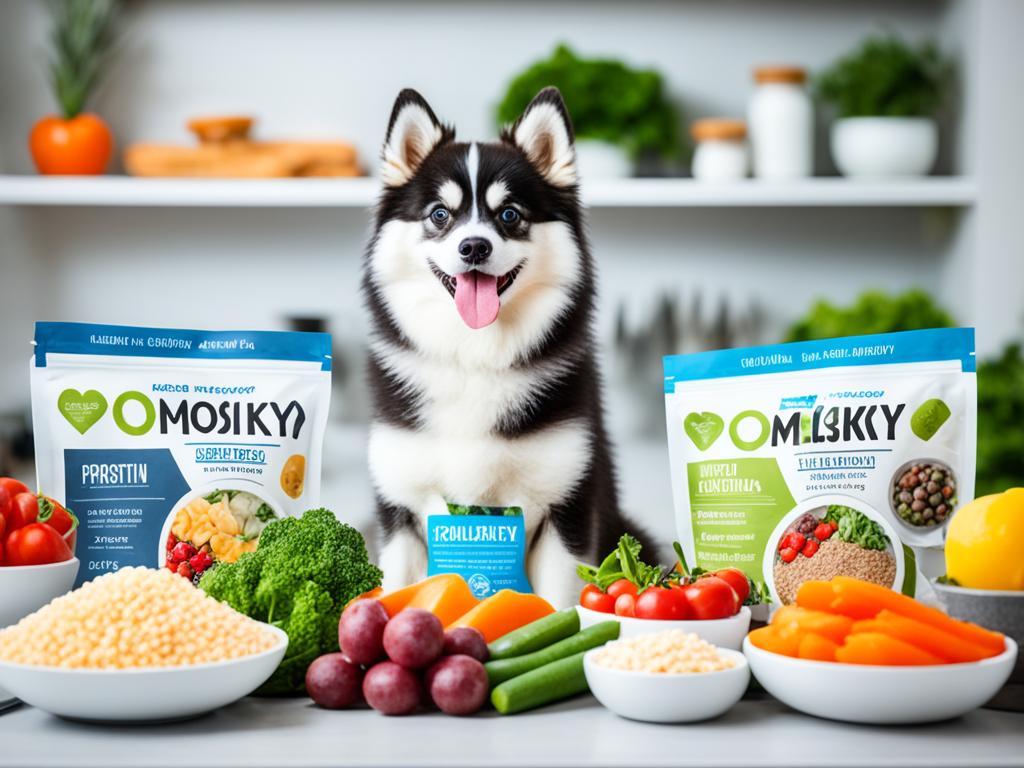
Leave a Reply